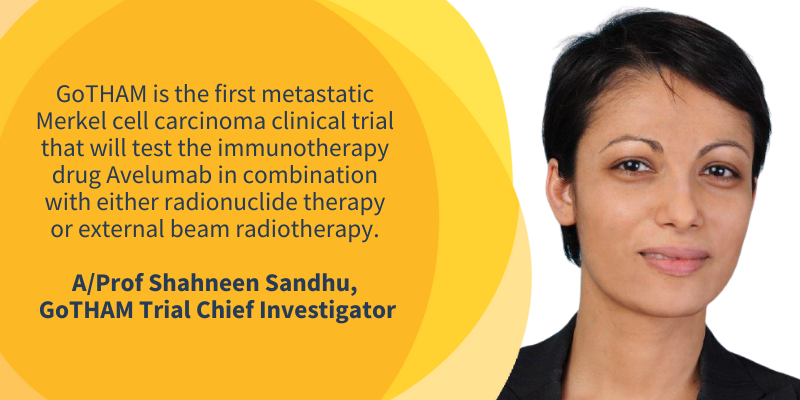Although rare, metastatic Merkel cell carcinoma is the deadliest form of skin cancer in Australia, and current treatments only lead to a five-year survival rate for 18 percent of patients.
With 300 new cases being diagnosed each year, Australia has the highest incidence of this aggressive neuroendocrine skin cancer, which can quickly spread to other parts of the body.
A new innovative clinical trial led by Melanoma and Skin Cancer Trials Ltd. (MASC Trials) hopes to find a novel treatment combination for patients who have developed metastatic Merkel cell carcinoma.
The GoTHAM trial, headed by Associate Professor Shahneen Sandhu, a Consultant Medical Oncologist at the Peter MacCallum Cancer Centre, is the first metastatic Merkel cell carcinoma clinical trial that will test the immunotherapy drug Avelumab in combination with either radionuclide therapy or external beam radiotherapy.
A/Prof Sandhu said around 70 percent of metastatic Merkel cell carcinoma patients have a form of the cancer that is suitable for radionuclide therapy, while other patients receive external beam radiotherapy.
“Metastatic Merkel cell carcinoma is highly responsive to radiotherapy and radiation has been shown to enhance the anti-tumour effects of immunotherapy, so there is a strong rationale that either approach could amplify the effect of immunotherapy,” A/Prof Sandhu said.
“Although many metastatic Merkel cell carcinoma patients respond to single agent immune therapy, some patients don’t respond or develop resistance, which is why we are hopeful a combined approach will have better outcomes for patients.”
“With the high-quality evidence gathered from this clinical trial, oncology teams treating metastatic Merkel cell carcinoma patients can be confident that combining Avelumab with either radionuclide therapy or radiotherapy will yield the best possible results,” she added.

The GoTHAM trial builds on interdisciplinary collaboration including research expertise into Merkel cell carninoma by Dr Richard Tothill at The University of Melbourne’s Centre for Cancer Research, and radionuclide expertise by Professor Rod Hicks at the Peter MacCallum Cancer Centre. Peter Mac’s radiation oncologist Dr Margaret Chua and A/Prof Paul Neeson, whose lab explores immune responses to tumours and immunotherapy, are also integral to the trial.
The Australia-wide multi-centre, phase Ib/II trial is seeking 65 patients. With six trial sites open nationally, MASC Trials is now looking to open tele-trial sites in regional Australia in early 2022.
“Due to the rarity of this cancer, it is challenging to find the number of participants required to produce the evidence necessary for this new treatment option. We urgently need more patients from all over Australia,” A/Prof Sandu said.
Australia reports the highest incidence of Merkel cell carcinoma in the world, although it is still considered a rare disease compared to other skin cancers such as melanoma. Merkel cell carcinoma is thought to be caused by either a virus or excessive sun exposure, with the sun exposure form most common in Australian patients.
For recruiting sites and additional information view the GoTHAM trial.

